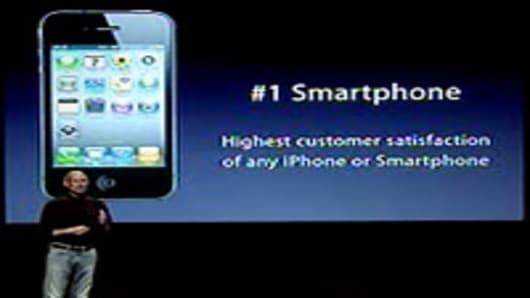—This flap ultimately won't depress Apple stock for long, it won't even hurt sales of the iPhone 4. Not to worry, right?
—At stake, though, are two things that may be as important: Apple's reputation as the best marketer in the world and as a designer of "insanely great" stuff; and Apple's credibility as a company that tells the truth.
—It's fitting this is called Antennagate, because in the original "gate"—Watergate—the same two critical questions emerged: What did you know, and when did you know it?
On the marketing angle, Apple teaches us a valuable lesson: When apologizing, persnickety doesn't work. In marriage, telling your spouse "I'm sorry, but you..." will get you a divorce. In child rearing, when your kid says, "But everybody else does it, too," it won't spare the kid some form of punishment.
And in marketing, when you have to apologize, just do it and shut up.
DON'T say we're sorry, but lots of other phonemakers have this problem too, and now we're gonna mention a few by name.
That lacks . . . accountability and responsibility. And class, maybe. Worse, it's bad tactically: It kept this story in the news for a second week, when the whole point of Jobs' rare appearance on Fridaywas to silence the hue and cry.
On the truth angle: This is the company that cited "hormone imbalance" as the reason for Steve Jobs's alarming weight-loss after undergoing treatment for a less lethal form of pancreatic cancer. Weeks later we learned the real reason: He'd had a liver transplant.
If that wasn't a baldfaced lie, it was, at least, a bit deceptive, no?
So now Jobs himself publicly brands as "a crock" the report by Bloomberg News that an engineer at Apple had warned him of the antenna problem ahead of time.
Steve Jobs further says he learned of the real problem only one day after shipping the new iPhone 4. Yet at the same presser on Friday, Jobs also said that Apple indeed anticipated antenna problems before launch, but proceeded anyway because "everyone" contends with this same flaw.
So which is it, Mr. Jobs: Did Apple know about the problem ahead of time, or is Bloomberg full of crock-contents?
Whom should we believe—Apple? Or Bloomberg, a buttoned-down, inordinately cautious news organization that is so painstakingly thorough, so obsessed with being "fair," that its editors cut adjectives out of stories because they can't be "proven."
I'm going with Bloomberg on this one. As the news service's spokesman, Ty Trippet, told me earlier today: "Our reporting speaks for itself."
Indeed it does . . .
More on Apple:


